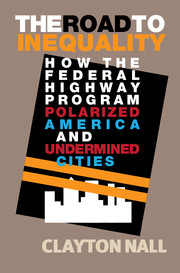Book contents
- Frontmatter
- Dedication
- Contents
- List of Figures
- List of Tables
- Guide to Abbreviations
- Acknowledgements
- 1 Introduction
- 2 How Highways Facilitate Partisan Geographic Sorting
- 3 Highways Polarize Metropolitan Political Geography
- 4 Transportation Becomes a Partisan Issue
- 5 Implications for Transportation Policy Making
- 6 Conclusion
- Bibliography
- Index
2 - How Highways Facilitate Partisan Geographic Sorting
Published online by Cambridge University Press: 19 March 2018
- Frontmatter
- Dedication
- Contents
- List of Figures
- List of Tables
- Guide to Abbreviations
- Acknowledgements
- 1 Introduction
- 2 How Highways Facilitate Partisan Geographic Sorting
- 3 Highways Polarize Metropolitan Political Geography
- 4 Transportation Becomes a Partisan Issue
- 5 Implications for Transportation Policy Making
- 6 Conclusion
- Bibliography
- Index
Summary
In this chapter, I show that highways have been the sine qua non of modern suburban growth and the associated partisan geographic sorting observed during the postwar period. I outline the mechanisms by which highways facilitate the type of development that leads to urban–suburban polarization. I demonstrate that highways do more to shape metropolitan geography than merely facilitate suburban population growth and urban population decline. Highways have shaped metropolitan poltical geography in two ways: catalyzing residential migration and filtering migration by selectively providing mobility throughout metropolitan areas. First, highways play a role as a catalyst of Americans’ divergent residential preferences. They have exogenously increased the daily travel range of automobile users, providing them a larger set of neighborhoods to choose from to match their residential preferences. Where local housing policy is economically or racially exclusionary, highways have facilitated the selective migration of groups that are able to live in suburban neighborhoods, exacerbating the adverse effects of local exclusionary policies. Second, highways act as a filter on residential migration and selection, providing direct mobility improvements to automobile users and fewer mobility advantages to those who lack automobiles or rely on transit.
Of course, race, income, and partisanship are correlated, and highways facilitate urban–suburban sorting on all three of these variables, which may lead some readers to ask whether partisan sorting and geographic polarization are nothing more than a second order effect of racial and socioeoconomic sorting. Only the causes of racial and income segregation have previously been analyzed in any depth, while partisan segregation is often treated as a secondary consequence of the other two. Scholars across multiple disciplines have demonstrated that highways facilitated “white flight.” For example, modern urban and suburban history scholarship often refers to the role of expressways in suburban growth and migration (e.g., Jackson, 1985, 249–50; Cohen, 2004, 196–99; Kruse, 2005, 243–44). Recent work in urban economics has carefully estimated how highways facilitated suburban population growth (e.g., Baum- Snow, 2007a, b). While these diverse studies have linked Interstate highways to white flight in the postwar period, they rarely have addressed how partisan geography has changed as a result.
- Type
- Chapter
- Information
- The Road to InequalityHow the Federal Highway Program Polarized America and Undermined Cities, pp. 23 - 50Publisher: Cambridge University PressPrint publication year: 2018



